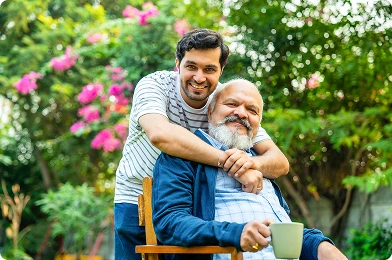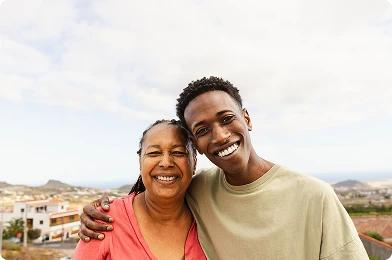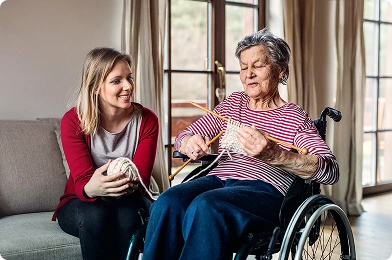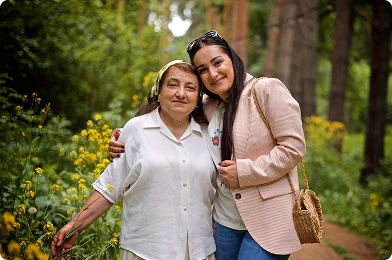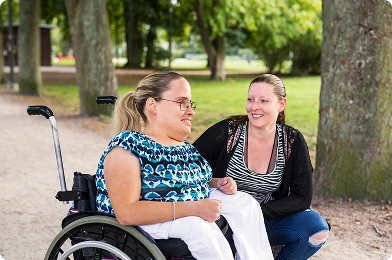What Is It Called When a Family Member Takes Care of You?
27 Aug 2024

When a family member cares for a loved one with physical or mental ailments, it’s called family caregiving. Family caregivers play a significant role in healthcare, providing at-home assistance with daily activities to enhance the quality of life for those in their care.
CaringPays aims to provide a network of healthcare resources to those we serve, including training, family caregiver pay, and in-home care assistance in the states we serve including Colorado, Georgia, Indiana, Maryland, Massachusetts, New York, Pennsylvania, and Washington, D.C. Here, we discuss what a family caregiver is and the common duties.
What Is a Family Caregiver?
As people age, their mobility, mental sharpness, and strength often decline, making daily tasks challenging and potentially unsafe. In addition, medical conditions and other factors can further prevent individuals from completing tasks on their own. Therefore, these individuals require additional assistance and support.
Many elderly adults prefer to age in place in the comfort of their homes rather than uproot their lives and move into new living environments. Family caregivers offer them that opportunity by operating as extensions of healthcare systems and performing a wide range of services, such as:
Personal Care
Personal care is an important step for all walks of life. It is necessary for maintaining a person’s health, dignity, and quality of life. Failing to properly care for yourself can increase the likelihood of illness and infection and can cause existing conditions to worsen.
Due to the limitations common with older individuals or those with disabilities, personal care can become difficult to accomplish alone. Family caregivers may assist with bathing, dressing, grooming, eating, and using the restroom.
Household Duties
A safe environment is crucial for aging adults and disabled individuals. Slips and falls are common among older adults and can lead to serious consequences. The Centers for Disease Control and Prevention (CDC) reports 1 million fall-related hospitalizations among older adults each year.
Most falls result from a combination of risk factors, including home hazards. The more risk factors, the greater the chance of an accident, which can lead to injuries and further impairment. Family caregivers are tasked with completing household duties such as cleaning and clearing pathways to make the living environment for their loved ones safer.
Medication Assistance
Medications are an intricate part of care. Staying on top of medications and other prescribed treatments can be difficult for anyone with fading cognitive skills. Family caregivers can help prevent the costly and negative consequences of medication misuse by providing medication management services. These services can entail listing, tracking, and organizing medications and reminding loved ones when to take them.
Companionship
Companionship is an often-overlooked component of family caregiving, but it may have the biggest impact. It prevents social isolation, which can negatively affect self-esteem, stress levels, and sleep. Companionship also provides a sense of belonging and happiness, which is especially important for older patients because they are at a greater risk of loneliness.
The bond formed through family caregiving not only benefits the care recipient but the family member providing the care as well. Many family caregivers report positive experiences such as growing closer to their loved ones and the satisfaction of knowing their loved ones are receiving excellent care.
Advocate for Loved Ones
Family caregivers spend a lot of time with the people under their care. Therefore, they are well–positioned to advocate for care recipients. For example, family caregivers can speak on behalf of their loved ones during doctor visits and detail changes in health based on first-hand experiences.
Food and Nutrition
Proper nutrition is essential no matter your age. It’s especially important for aging adults because it helps them remain healthy and strong. Poor nutrition can lead to muscle weakness and decreased bone mass, which can increase the risk of falls and fractures. Furthermore, consuming the proper type and amount of nutrients helps to prevent several common illnesses found in older patients, such as osteoporosis, high blood pressure, heart disease, type 2 diabetes, and certain cancers.
As a family caregiver, you most likely will prepare and serve meals to your loved one. Meals should be balanced and include a variety of fruits, vegetables, lean proteins, whole grains, and healthy fats. Additionally, family caregivers should be aware of any ingredients that can interact with their loved one’s medications.
Learn More About Getting Paid for Family Caregiving
Family members may not feel comfortable leaving their loved ones in the hands of someone they don’t know. In these cases, they take it upon themselves to provide care and support as a family caregiver. These individuals may be eligible for family caregiver pay to account for the financial burdens of the role.
CaringPays is committed to helping interested individuals become family caregivers and get paid for it. Our agencies include locations in Colorado, Georgia, Indiana, Maryland, Massachusetts, New York, Pennsylvania, and Washington, D.C. Contact your local agency today to see if you qualify and begin the application and enrollment process to become a paid family caregiver.

